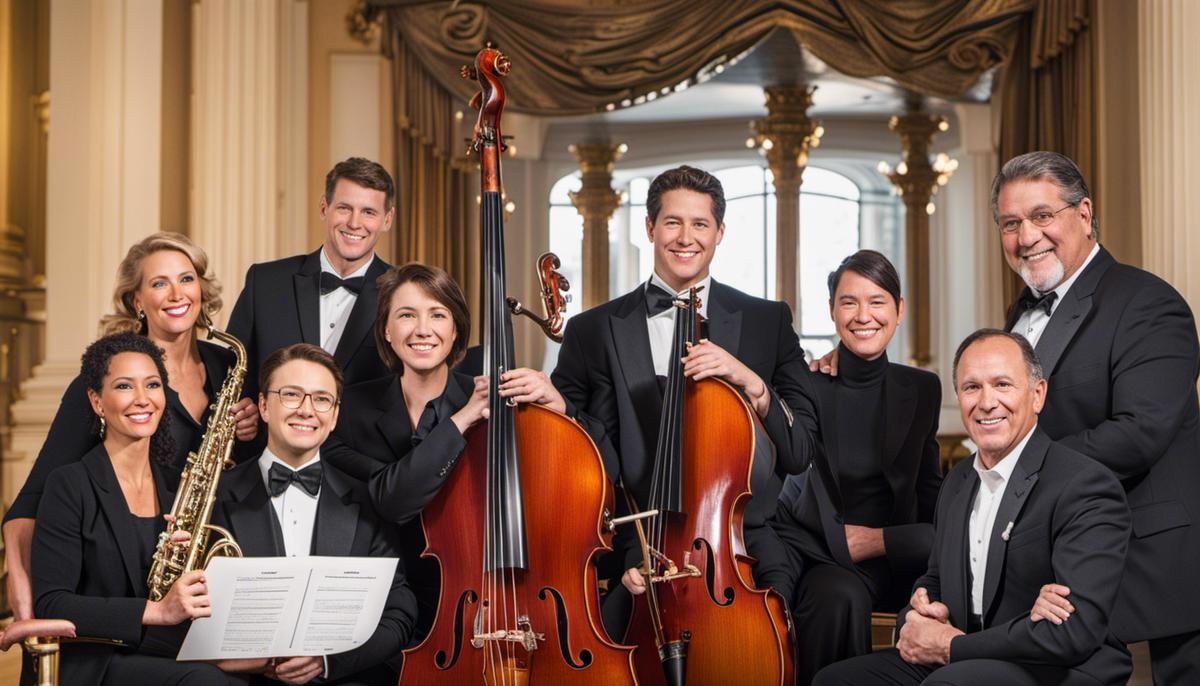Table of Contents
Introduction
Being a bassionisit than an inherent love for music; it demands a profound understanding of your role and the specific skills necessary to become proficient in the art. Whether your aspirations lie in playing in an orchestra or venturing into unique musical genres, the pathway to a successful career is paved by a combination of technical expertise and dynamic cultural intelligence.
This exploration delves into the demanding yet enriching life of a bassoonist, shedding light on the various career options, best practices for networking and professional development, and the economic aspects that underlie a career in this field. In your pursuit to master this unique instrument, understanding the blend of musical abilities, career opportunities, relationship building, and economic factors is essential in navigating the landscape of your potential bassoon career.
Understanding the Role and Skills of a Bassoonist
The Role of a Bassoonist
A bassoonist, like other musicians, is tasked with the responsibility of musically interpreting and performing compositions using their chosen instrument – the bassoon. Often an integral member of an orchestra, symphony, or chamber music group, a bassoonist performs a range of music genres varying from classical to modern pieces. They may also perform as soloists. Beyond performing, a bassoonist may also have responsibilities such as rehearsing, practicing, tuning their instrument, and studying and learning new compositions.
Musical Skills Required for Bassoonist
There are numerous musical abilities that a bassoonist must possess and continually enhance. As with any musician, they need an understanding of musical theory, which includes being able to read and understand musical notation. Given the intricate nature of the bassoon, the player must have excellent breath control, a sense of rhythm, and the ability to produce a variety of tones and pitches. Another fundamental ability is the capacity to transition smoothly between notes, mastering various techniques such as slurring or quickly articulated repeated notes.
Reading Music: Bass Clef to Tenor
Bassoonists must thoroughly understand how to read music notations, specifically the bass clef and tenor clef – the clefs most used for bassoon music. Learning these is critical as they guide the musician on which notes to play and at what pitch. The tenor clef is significantly employed in the upper register of the bassoon. Proficiency in reading music written in these clefs is essential to executing a piece accurately.
Importance of Rhythm, Tones, and Pitches in Playing Bassoon
Understanding and maintaining rhythm is crucial to playing any piece on the bassoon or any musical instrument. A bassoonist must be able to follow a set rhythm, which is often dictated by a conductor in an orchestra or ensemble setting. Mastery of tones and pitches is equally important; especially since the bassoon can produce a wide variety of tone colors making it versatile for many types of music. This versatility contributes to the richness of orchestral music and highlights the bassoon’s unique sound quality.
Understanding Keys in Playing Bassoon
One of the defining features of the bassoon is its keys – it has more keys than many other woodwind instruments. These keys, which usually number over 20, allow for a wide range of notes to be played and facilitate complex fingerings. Mastery of the keys is critical to a bassoonist’s ability to quickly and smoothly transition between notes, creating a cohesive and fluid sound.
Exploring Bassoonist Career Opportunities
The bassoon is a versatile instrument offering a broad range of career opportunities beyond the typical performance avenues. Many bassoonists find rewarding roles as members of orchestras, chamber musicians, or solo performers. Others deftly navigate the studio, contributing their unique sound as session musicians or recording artists. The field of education also beckons many a bassoonist, instructing students in schools, offering private lessons, or mentoring budding musicians. Additionally, those who are not only adept at playing the bassoon but also possess technical skills can delve into the business of instrument repair and manufacturing. Regardless of the chosen path, proficiency in the bassoon is a must, supplemented with complementary skills such as teamwork, instructive intelligence, and hands-on technical abilities.
Career Pathways as a Bassoonist
Unveiling the Role of a Bassoonist in an Orchestra
Being a bassoonist in an orchestra stands as a cornerstone in music careers. Bassoonists are entrusted with the task of weaving low-pitched melodies that imbue the orchestral performance with richness and profundity. They collaborate with fellow wind instrument musicians to orchestrate balanced musical sections and are often put in the spotlight where they can display their talent through solo parts. To become part of an esteemed professional or semi-professional orchestra, a musician must prove their mettle through auditions. Once on board, they engage in regular rehearsals and performances, rub shoulders with a diverse group of musicians and conductors, and have the privilege to breathe life into a variety of classical and contemporary works.
Becoming a Soloist Bassoonist
Another pathway is to pursue a career as a soloist. This path is less common than playing in an orchestra due to the limited pieces composed for the bassoon solo. However, well-known soloists often showcase their talent in concertos – a composition for one or more principal instruments, with orchestral accompaniment. Soloists must have a high level of musical skill and display an impressive ability to perform complex pieces. Bassoonists who pursue this career path often also teach or play in an orchestra to supplement their income as solo performances may not happen as often.
Teaching Bassoon in Schools or Private Institutions
Teaching can be a rewarding career for bassoonists who want to cultivate a love for this unique instrument in upcoming generations. Bassoonists can teach in schools, offering students the foundations of music theory and bassoon technique. They may also work in private institutions or offer private lessons to students of all ages. This profession requires extensive knowledge of the instrument, pedagogical methods, and a good deal of patience. Teachers may also be involved in preparing students for performances, exams, and auditions.
Career as Studio Bassoonist
With the growth in digital media and technology, there is a demand for bassoonists in unique settings such as recording studios. Studio bassoonists record for film scores, television soundtracks, commercials, and video game music. This role involves collaboration with composers and sound engineers, and can require bassoonists to adapt quickly to different music styles and recording techniques. It provides the excitement of working on diverse projects; however, it can also be a competitive field to enter.
Specialized Roles in Unique Music Genres
Beyond these traditional roles, bassoonists may also find unique opportunities in less recognized music genres. Some bassoonists might specialize in historically informed performances of Baroque or Renaissance music, using period instruments for authenticity. Others may explore experimental genres, such as jazz or electronic music, that use bassoon techniques in innovative ways. These niche paths can offer the chance to push the boundaries of the instrument and engage with music in fresh and exciting ways. However, they may also require strong self-promotion skills, as opportunities in these areas can be limited.
There are numerous avenues to venture through for a career as a bassoonist. From playing in an orchestra, being a solo artist, to becoming a teacher or a studio musician, or even delving into unique musical genres – the possibilities for a bassoonist are varied. Each avenue opens its own set of unique rewards and challenges, necessitating certain skills. Therefore, it’s crucial for emerging bassoonists to thoroughly research, ponder, and determine which path aligns with their career aspirations and musical passions.

Networking and Professional Development
Making Connections within the Music Industry
In the sphere of music, building strong networks is crucial, particularly for bassoonists striving to carve a successful career. The music industry runs on the fuel of relationships and connections. Networking opens channels to interact with industry professionals such as music directors, conductors, and fellow musicians who can guide one’s career path and provide valuable advice.
Establishing a strong network can lead to opportunities such as music festivals and workshops, platforms where one can showcase their skills and gain insight from experienced professionals in the field. Musicians who prioritize networking often witness a faster career growth by leveraging opportunities that surface within their circles.
Music Festivals and Workshops
Playing the bassoon at music festivals introduces a musician to a broad audience, including music aficionados, industry professionals, and other musicians. These festivals become platforms for bassoonists to demonstrate their proficiency and attract the attention of influential individuals within the music industry.
Workshops, on the other hand, offer opportunities for skill enhancement. These spaces provide expert training, professional feedback, and targeted instruction on honing one’s skills playing the bassoon. Workshops can also offer insight into the business side of music, helping bassoonists understand how to navigate the market.
Professional Associations for Bassoonists
Associations such as the International Double Reed Society (IDRS) and the American Federation of Musicians (AFM) are invaluable to emerging and established bassoonists. These associations offer resources like music publications, exclusive events, and job boards. They also provide platforms for musicians to connect, interact, and form professional relationships. Bassoonists can gain significant exposure through participation in these associations, further broadening their career prospects.
The Role of Mentors in Career Development
Career development in music, more specifically, as a bassoonist, heavily relies on the guidance of experienced persons in the sector. Experienced bassoonists and mentors play a crucial role in an individual’s career, offering advice accumulated from years of working in the industry.
Mentors provide artistic direction, helping young musicians understand the bassoon’s intricacies and nuances, and provide constructive feedback. Additionally, mentors often use their networks, introducing mentees to influential personalities that could help advance their careers.
When pursuing a career as a bassoon player, constant professional growth is crucial. This involves a combination of networking, attending workshops, joining professional associations, and receiving guidance from a seasoned mentor. All these activities are essential for a bassoonist’s career progression. They provide opportunities to expand their skills, gain insights into the music industry, and create meaningful relationships that can spur professional growth.
Economic Aspects of a Bassoon Career
Potential Bassoonist Careers and Earnings
As a bassoonist, you have access to numerous professional opportunities. These include not just positions in orchestras, chamber music groups, and wind quintets, but also teaching roles in schools or private settings. Many bassoonists choose to diversify their revenue sources by performing in multiple groups and teaching a combination of private students and school music programs. Additionally, experienced bassoonists with a diverse repertoire could also consider recording or session work.
Incomes from performing in renowned orchestras or bands are generally higher than those from teaching positions. However, job security might be a concern given the highly competitive nature of these roles and the limited number of available bassoon positions. Major orchestras in the US pay musicians anywhere between $25,000 and over $100,000 annually, depending on the orchestra’s status. On the other hand, teaching typically provides a more predictable income, with private lessons averaging from $30 to $60 per hour.
Investments and Maintenance Costs
The financial aspect of becoming a professional bassoonist goes beyond simply earnings. It also includes considerations for maintaining your instrument, purchasing reeds, and even travel costs for performances and auditions. Here are some points to consider:
- A professional-grade bassoon costs anywhere from $20,000 to $50,000. There are cheaper student models, but progressing in your bassoon career often necessitates an investment in a higher-quality instrument.
- It’s recommended to have your bassoon serviced annually. This usually costs around $200-$500 but may be more if significant repairs are needed.
- A bassoonist will go through many reeds over their career. A single reed can cost between $15 and $30, and most performers go through them quickly, needing a new one every one to two weeks.
Scholarships and Educational Grants
Though the costs may seem daunting, there are several avenues to alleviate some of the financial strain. Budding bassoonists can apply for scholarships at music conservatories or universities, opening up opportunities for paid tuition or even stipends. Many institutions also offer financial aid packages, including grants and work-study programs.
Music-focused organizations also offer scholarships and grants. For example, the National Endowment for the Arts provides various grants for performing artists. The Music Teachers National Association (MTNA) offers a number of competition-based scholarships for young musicians.
Freelancing and Entrepreneurship
As an alternative or supplement to traditional employment, many bassoonists find success as freelancers or entrepreneurs. This could involve starting a private teaching studio, performing at weddings and other events, or even setting up an online platform for remote lessons.
The income from freelance work varies greatly and can be less predictable than salary employment. However, with savvy marketing and an entrepreneurial spirit, many bassoonists have used freelancing to achieve their financial goals.

Conclusion
The financial aspects of a career as a bassoonist are multifaceted and require careful consideration. With a range of employment opportunities, potential for scholarships and grants, and the need for regular investment in the upkeep of the instrument, understanding the costs and profits associated with this career path is crucial.
Grasping the intricacies of a career in bassoon goes beyond the music sheet. It’s about understanding the whole canvas – your role as a performer, the rich array of career possibilities, the importance of networking and personal development, and the pragmatic economic considerations involved in maintaining this career.
The relevancy of a mentor, the dedication to continuous learning, and the right network can shape, influence, and steer one’s journey in the bassoon world. This exploration serves as a backstage pass, providing glimpses into what awaits a passionate bassoonist. The next symphony awaits; the reeds are ready, and the notes are set. It’s time to create your unique composition in the world of bassoons.
Additional Reading
Take some time to check out our other articles:
- Top Compressor Plugins for Subtle Dynamic Control
- How to Set Compressor Parameters for Punchy Drums
- Vintage vs Modern Compressor Plugins: Which Is Right for Your Music?
- How to Avoid Over-compression Using Your Favorite Plugins
- Review: the Most Versatile Compressor Plugins for Any Genre
Breve Music Studios publishes music to Spotify, YouTube Music, Amazon Music and more. Follow our pages on Facebook, Instagram, Twitter, TikTok, and YouTube.
Listen to our ensembles: Breve Orchestra, Breve Music Ensemble, Breve Low Brass Ensemble, Breve Woodwind Ensemble, and Jermaine Harris on Spotify.

